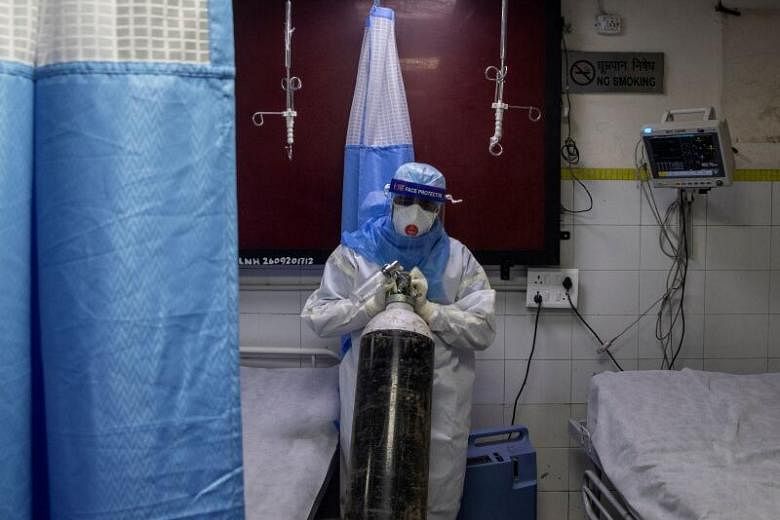NEW DELHI - States in India are reporting a shortage of medical oxygen, which is needed to treat Covid-19 patients, as demand outstrips supply amid an unprecedented increase in coronavirus cases in recent weeks.
The situation is particularly acute in the state of Maharashtra, India's worst-hit state with more than one million cases. As of yesterday morning, it had 280,138 active cases, up from 150,966 on Aug 1, resulting in a substantial and unforeseen increase in demand for oxygen.
Hospitals in smaller cities of the state, according to local media reports, are not admitting critically ill patients and some are even shifting those under their care to bigger hospitals in the state capital Mumbai.
While supply has been tight through the pandemic, Dr Amit Thadhani, the director of Niramaya Hospital in Navi Mumbai, told The Straits Times it is "close to being completely broken down" in recent days. "Many hospitals are getting pretty desperate for getting adequate supplies of oxygen," he said.
His hospital currently has 40 of its 55 Covid-19 beds occupied. This requires a daily supply of around 90 jumbo cylinders with a capacity of around 7,000 litres of oxygen each but the hospital has been able to secure just around 20 such cylinders a day.
"There is a situation where we have to monitor as to which patients we can manage by reducing the flow safely and with which patient there is no possibility of any compromise at all," Dr Thadhani said. "We are not in a position to take fresh ICU admissions until we are not assured of oxygen supply."
Officials have sought to attribute the crisis to an uneven distribution of medical oxygen producers in the country and deficiencies in the supply chain rather than a lack of actual production. This crisis even prompted the Maharashtra government to specify on Sept 7 that 80 per cent of the state's production of oxygen has to be reserved for use in Maharashtra's hospitals, instead of those in other states. While it allowed industrial use for the remaining 20 per cent, it added that priority should be given to hospitals over industry.
The move affected some hospitals in Madhya Pradesh that depend on oxygen supply from Maharashtra. The federal government, meanwhile, issued a directive to all states on Sept 11 "to ensure no restriction is imposed on the movement of medical oxygen".
With more than 94,000 cases reported on Sunday, the number of total cases in India has crossed 4.75 million and 78,586 deaths have been registered. The number of active cases in the country has also gone up from 565,103 on Aug 1 to 973,175.
A similar shortage in supply has also been reported from Gujarat, Karnataka, Punjab, as well as Jammu and Kashmir. Hospitals in Punjab required around 1,000 jumbo cylinders per day in April but demand has now gone up to nearly 10,000 daily, pushing the state to divert supply from industries.
Mr Rupinder Singh Sachdeva, the managing director of Hitech Industries Limited, which is the key producer and supplier of medical oxygen in Punjab, said around 20 per cent of his total supply would earlier go to hospitals and the rest would be used up by industries.
His entire supply is now being consumed by hospitals. "Yet, a hand-to-mouth situation is going on," he told The Straits Times. The firm's daily procurement of liquid oxygen from outside the state has also fallen from around 30 to 20 tons as suppliers meet rising demand elsewhere.
While states have begun setting up additional medical oxygen plants, ramping up production is a long drawn process. "Setting up a new plant takes around one year," added Mr Sachdeva.
The number of coronavirus cases, meanwhile, also continue to increase in Indonesia. On Sunday, the country reported its sixth consecutive day of over 3,000 new cases, bringing the total number of infections to 218,382 and deaths to 8,723.
The country's capital Jakarta will begin reimposing stricter and wider restrictions beginning Monday. Residents in the city who test positive can no longer be quarantined at home and will be isolated in government facilities.












